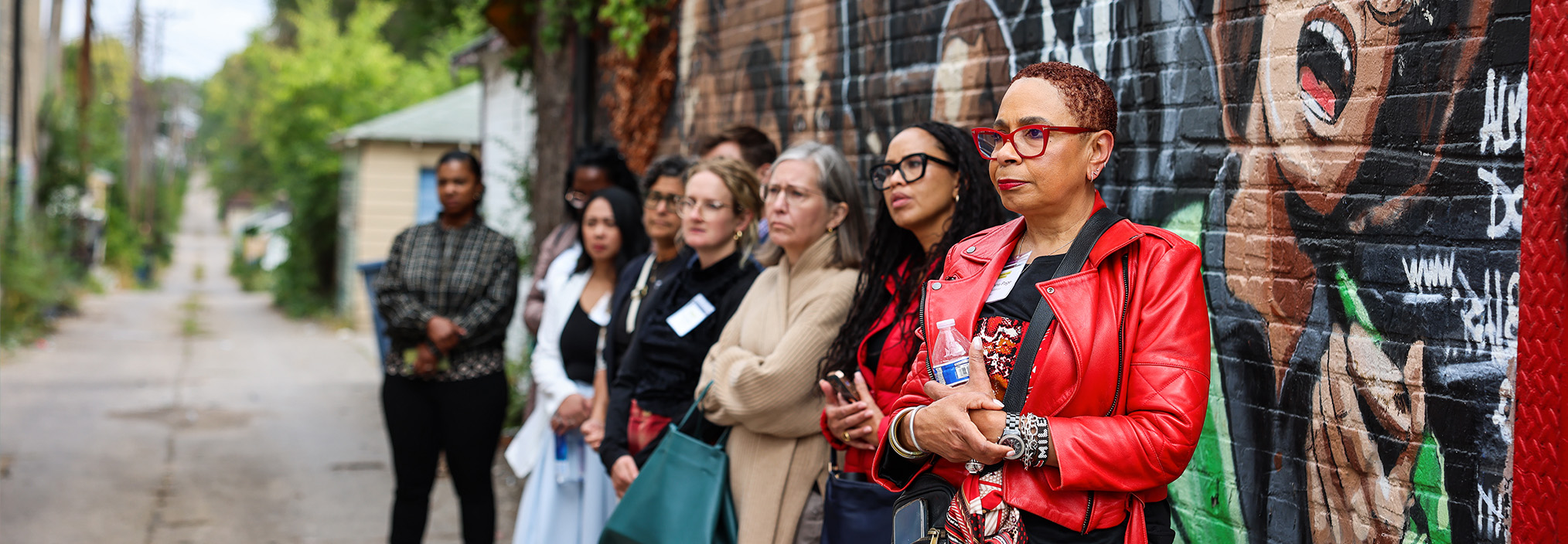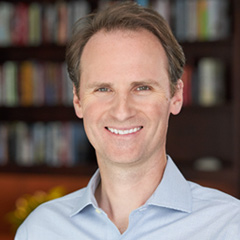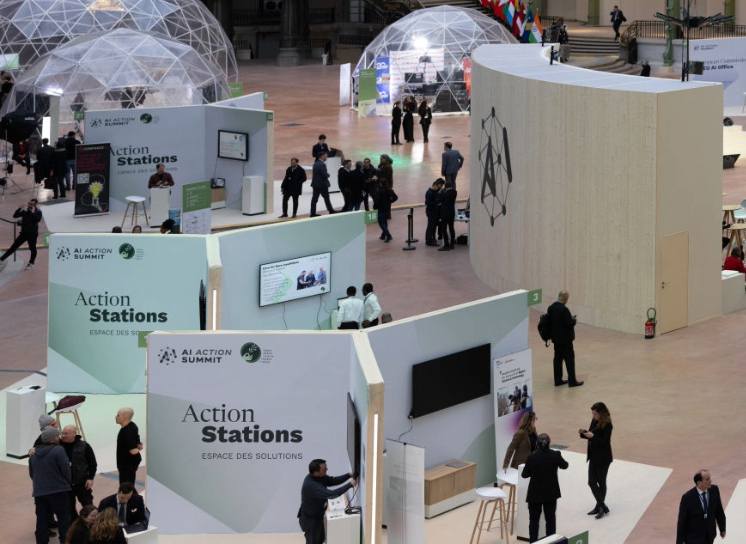
Funders and grantees learn about community-centered strategies to advance democracy, address inequities, and develop relationships, hosted by the Democracy Frontlines Fund in Minneapolis, Minnesota. Credit: Jean Melesaine

John Palfrey, President
May 22, 2025
We are asking fundamental questions about what kind of a country, what kind of a world, we want to live in. Long-held freedoms—the freedom to give, the freedom to invest, the freedom to speak—are in question. The rule of law is being tested. Decades of hard-won progress to combat pervasive unfairness and discrimination is under threat of being rolled back. Those of us working in charitable foundations and nonprofits have come under pressure that is unprecedented in American history.
It is a moment in time when we must stand firm and steadfast in support of fundamental truths and commitments. For MacArthur, that means that we continue to reaffirm our values and our mission and to seek new ways to advance the work of our grantees, investees, and partners. That means we will speak up for the rule of law in America and around the world. It means we will stand with and for our colleagues in charitable foundations and nonprofits as we fund according to our mission and values—freely and without interference, even when we disagree with them on many specific issues.
We seek at once to be steadfast and true to our longstanding mission while also leaning deeply into our values of learning and creativity.
We seek at once to be steadfast and true to our longstanding mission while also leaning deeply into our values of learning and creativity. We know we have not gotten everything right. The outcomes we have sought through our charitable work have not been fully achieved. We have work to do. We know we can and must do better.
We live in a world that feels divided, where too many feel isolated, where too many live without hope of a better future. We can and must create a world where people can imagine a brighter future for themselves and their families, come what may. Through collaboration, through creativity, through continuous learning—we can help to bring about a brighter future in America and around the world.
I am inspired, along with my colleagues, to find ways to pursue bridging and belonging, to build new partnerships and collaborations, to include more people in our shared work. That is what we intend to do through our Just Imperative and our work on diversity, equity, and inclusion at MacArthur Foundation.
We must do a better job at expanding our worldview and broadening our coalitions. In the philanthropic sector, though we may not share the same beliefs or perspectives, we are prepared to defend core freedoms, to speak up loudly and together. Charitable foundations can and must work together to meet the moment and defend the nonprofits we support and the communities they serve.
We must do a better job at expanding our worldview and broadening our coalitions.
At MacArthur, one way we are stepping up is by increasing our charitable payout to at least 6 percent for 2025 and 2026. That is a new floor, not a ceiling. Where possible, we are using flexible, trust-based models for our charitable gifts. Many of our peers, we appreciate, have done and will do even more, which we applaud. We know all of us can do more, be more generous, be more flexible as we seek to improve the way we do our work.
Belonging: Instead of Division, Build Bridges
We believe there is essential work to be done to bring about a world in which more people can thrive and more people see themselves as essential parts of an inclusive future. As we pursue this work, I am moved by two thinkers in particular this year.
One is john powell, who works through the Othering & Belonging Institute to make the case that belonging necessarily includes everyone: every individual is a part of and empowered in the decisions, spaces, institutions, and communities that shape their lives. To realize this broad vision, we must build bridges between people and social groups who have historically seen themselves as opposites, rivals, competitors, and make sure that all perspectives are reflected in decisions.
We all want to prosper, we all want to live in a safe home, we all want to be able to speak our mind, we all want to thrive.
Another thinker whose work speaks to this moment is Kenji Yoshino, who talks about this way of bridging in his book Say the Right Thing. Uncommon connections have the power to bridge us and highlight our shared humanity and interconnectedness, but they need to be specific, not generic. Yes, we all want to prosper, we all want to live in a safe home, we all want to be able to speak our mind, we all want to thrive. But what does that look like?
If we have the capacity to build this kind of broad base on seemingly divisive issues, what makes it so challenging to apply? Often it boils down to identity: we are separated and constrained by stereotype, by racial, economic, and political boundaries and struggle to show our full selves.
It may be surprising, but people in every social group feel they have to hide parts of their identity for others’ comfort, what Yoshino describes as covering. Covering is what happens when an individual hides aspects of their identity that are outside the mainstream, and we often experience covering as a harm. He notes that “all of us have some outsider identities, and so therefore all of us will have experienced the covering demand.”
Covering negatively affects well-being and people’s ability to contribute to their workplace and their community. It is harder to feel confident in yourself, it is harder to contribute to conversations, it is harder to find common ground. If you are covering aspects of your identity, you certainly do not feel like you belong.
And in order to change, grow, and learn, you have to be resilient and confident. Yoshino notes in Say the Right Thing, that when we are more confident and secure, we are more resilient and can better handle the discomfort of disagreement, difference, and learning. So if instead of covering, we were able to bring our full selves, we might actually find the things that connect us; we might be able to grow and learn together, while being true to who we are.
Move Fast and Build Things
We have seen an approach travel this year from Silicon Valley to Washington, DC, that goes by the name of “move fast and break things.” At MacArthur, we are thinking of a different way. How about we team up to “move fast and build things”?
Our society is changing rapidly and, in some ways, treacherously. We have new technology, new social roles, new ways of relating to one another. Yes, this requires quick, responsive action. And instead of reverting to the easy pattern of “us vs. them” and of breaking things as we move fast, it requires calling people in as we construct better systems. It seems that we can indeed be better together if we are working together on building things.
At MacArthur, we are thinking of a different way. How about we team up to “move fast and build things”?
In uncertain times, one of the most important things is to have partners on whom one can rely. MacArthur can offer the assurance that we are a partner that can be counted on to carry out our longstanding commitments. We consider our mission—to bring about a more just, verdant, and peaceful world—to be our north star. We consider our core values to lie at the heart of those commitments. None of that has changed. We remain committed to expanding opportunity for everyone.
One area where we continue to ensure that we center people is in our work to support the humane development of artificial intelligence (AI). AI is disruptive, with both the potential to make our lives easier and the potential to cause substantial harm to humans. This technology is developing extremely quickly; many of its mechanics and impacts are neither widely nor well understood.

Technology, including but not limited to AI, is changing how we live, interact, succeed, do business, and connect. AI is pushing us into uncharted territory. So too might the development of quantum computing, which is a major center of innovation in our home state of Illinois. Many fears about these new technologies stem from the real impacts AI and algorithmic systems are already having on our lives. We have seen its harms in education and child protective services, and in housing and the justice system. We know that algorithms that underly social media and search engines are spreading mis- and disinformation, pushing us into different information ecosystems and different realities.
Technology, including but not limited to AI, is changing how we live, interact, succeed, do business, and connect.
But those leading AI in the private sector also tout its miraculous possibilities. Investments in AI could drive innovation across a wide array of sectors, including in healthcare where it could hasten the development of personalized medicine and accelerate drug discovery; education where it can enable adaptive learning technologies that cater to individual learning needs; and financial analysis where it offers enhanced predictive analytics and risk management capabilities.
In the nonprofit sector, there is great potential for AI tools to help us, as long as the quality of data is high. As James Fruchterman, technologist, MacArthur Fellow, and founder and CEO of Tech Matters, and Nithya Ramanathan, cofounder and CEO of Nexleaf Analytics, wrote in the piece Gather, Share, Build, we need data infrastructure that is big enough, up-to-date, and accurate enough to effectively address sector challenges.
With all the hype of AI on various sides, the truth lies almost certainly in between. AI is neither a panacea nor a poison. It is and will be what we make it. And we have the time and ability right now to shape that future, before it settles into place.
AI is a field where we might find unexpected agreement and create space for more belonging. Where do we want to bring AI into our lives and where does it demand more oversight and stronger guardrails? In this moment, humans can design where it can and cannot be adopted and define where these technologies can and cannot go in our lives.
AI is neither a panacea nor a poison. It is and will be what we make it.
To be sure, we must move quickly. But our speed must be constructive and collaborative and center the public interest. As we “move fast and build things,” we should center belonging and inclusion. We should prioritize our connection to each other and to communities. If we move together and with conviction, and ground our investments in inclusive values, we can build a better system that both protects the public interest from the worst excesses and realizes the opportunities AI could provide. We face crucial design choices today; we must not miss this moment.
Empower People to Shape AI's Development
The widespread adoption of AI requires careful management and regulation. We do not know what will come next, yet we have the chance to imagine both those futures that we fear and those that we find desirable. And we have a moment to make sure we center humanity as we move forward. There are many ways to build the guardrails we need to constrain and shape AI’s application in the near future.
We can start by bringing a wider array of people into the governance of AI. The people who are impacted by AI systems should be included and empowered in their implementation.
As researchers and leaders like Dr. Timnit Gebru of the Distributed AI Research Institute have called us to ask, who is AI for? And how can we actually include more people in oversight, accountability, and transparency in algorithms? Where can we put people in the process to make decisions and lead? How can we support and center the voices of those too often overlooked in technology design, such as those with disabilities? AI often relies on hidden, and exploited, human labor, a shadow workforce. How can we support the new AI workers and those who might be displaced or adversely affected by the adoption of these tools?
Including the community who it could most benefit and helping them direct the technology is essential to the way forward. One example of where this could work is using AI to develop technology that functions with under-resourced languages, so people can use devices in their native tongue. The Current AI partnership, for example includes linguistic diversity in its initiatives, so communities can benefit from AI in a way that supports their interests.
Humans are AI’s designers and its users, its investors and its inventors. We can also be its governors.
As Verity Harding, Director of grantee AI & Geopolitics Project at University of Cambridge, has pointed out, there are models for global cooperation, moving past AI nationalism and zero-sum thinking. Countries can collaborate on AI to advance national interests, in ways that maintain their security and advance shared knowledge.
We can also begin establishing useful barriers between and among AI systems and between AI systems and the analog world. This could ensure control as AI systems gain additional force, power, and reach.
Humans are AI’s designers and its users, its investors and its inventors. We can also be its governors. We have a unique opportunity to design systems with robust ethical frameworks and guardrails. And we can do it by empowering individuals, of every description, in determining where and how we use it.
Building Toward the Future
AI is just one area of rapid change; I am sure we can all think of dozens more.
As we face unprecedented challenges—some that were once unthinkable—to the fundamental institutions that govern our society, we need to double down on belonging.
When it seems we are most divided, we need to remember what bridges those divides. Let’s step up and stand up for our shared values. Let’s expand who we see as our allies. Let’s create spaces where no one has to cover their identity. Let’s include everyone in the decisions that impact them. Let’s ensure that every young person can see a pathway along which they can thrive and lead lives of meaning, purpose, and fulfillment.
“Hope and fear cannot occupy the same space at the same time. Invite one to stay,” the poet and author Maya Angelou wrote.
Let us always invite hope to stay as we build our future together.

I invite your comments, suggestions, and critique, with special appreciation for a candor that will challenge us to achieve greater clarity, humility, wisdom, and impact.
Please Share Your CommentsMore Annual Essays
READ MORE


